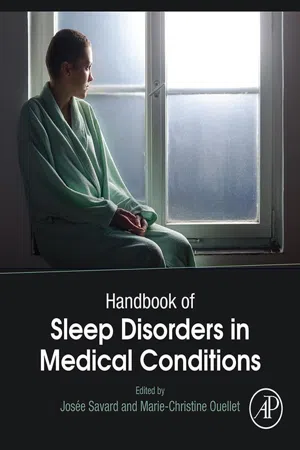
Handbook of Sleep Disorders in Medical Conditions
Josee Savard,Marie-Christine Ouellet
- 472 pages
- English
- ePUB (mobile friendly)
- Available on iOS & Android
Handbook of Sleep Disorders in Medical Conditions
Josee Savard,Marie-Christine Ouellet
About This Book
Handbook of Sleep Disorders in Medical Conditions reviews the current knowledge on the nature and manifestations of sleep disorders associated with a variety of common medical conditions, including epilepsy, traumatic brain injury and dementia. It also provides clinical guidelines on how to assess and treat them with pharmacological and non-pharmacological interventions. Although the general principles of sleep medicine may be applied to some extent to patients with comorbid medical conditions, this book makes the case that an adaptive approach is warranted when considering the particularities of each condition.
In addition, clinicians must also be cautious when prescribing sleep medications as some pharmacological agents are known to exacerbate symptoms associated with the medical condition, such as cognitive deficits (i.e. difficulties with memory and attention) in cancer patients experiencing chemo brain, or in persons with neurologic conditions (e.g. mild cognitive impairment, dementia, stroke, brain injury). A differential approach to evaluating and treating sleep is thus warranted.
- 2020 PROSE Awards - Winner: Category: Textbook/Medicine and Clinical Science: Association of American Publishers
- Presents a general overview on assessing and treating sleep disorders that are applicable to a diverse set of patients
- Provides a comprehensive, up-to-date review of the literature on the prevalence and manifestations of sleep problems related to specific medical conditions
- Includes practical information regarding special considerations for the assessment and treatment of sleep issues in specific medical conditions
- 2020 PROSE Award Subject Winner in Textbook/Medicine and Clinical Science (Association of American Publishers)
Frequently asked questions
Information
Cardiovascular Disease
Abstract
Keywords
Introduction
Contributions of Sleep Deficiency to the Development of Cardiovascular Disease
Sleep Duration
Table of contents
- Cover image
- Title page
- Table of Contents
- Copyright
- List of Contributors
- Preface
- Section I: General Issues
- Section II: Sleep Disorders in Specific Medical Conditions
- Index